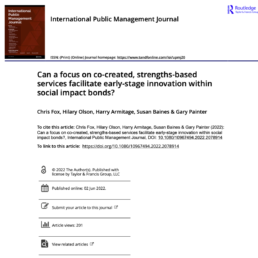Co-creation and strength-based working as characteristics of social innovation bonds.
Authors
Chris Fox, Hilary Olson, Harry Armitage, Susan Baines and Gary Painter
Abstract
While many commentators recognise the potential for Social Impact Bonds (SIBs) to encourage innovation, empirical evidence is less clear-cut. We argue that for SIBs to realise their full potential as incubators of innovation they needed to incorporate a stronger element of co-creation and strengths-based working, and suggest some accompanying characteristics of such SIBs. We analyse four UK SIBs as case studies that exhibit these characteristics. We find that within the cases strengths-based service delivery models were successfully implemented through SIBs; alongside this we found extensive evidence of co-production but limited evidence of co-creation. Strengths-based working, including co-production, helped the SIBs to catalyse early stage innovation. We identify several elements of SIB design which were instrumental in supporting strengths-based practices and could also support co-creation: greater autonomy for service providers; shifting risk to investors; use of a rate card; and long-term, flexible funding. Our findings challenge those who are sceptical about the potential for SIBs to provide a setting in which people who use services and frontline service providers are empowered to re-engineer public services and contest current systems.
Publication link
Full reference
Fox, C., Olsen, H., Armitage, H., Baines, S. and Painter, G. (2022) Can a focus on co-created, strengths-based services facilitate early-stage innovation within social impact bonds? International Public Management Journal, DOI: 10.1080/10967494.2022.2078914
